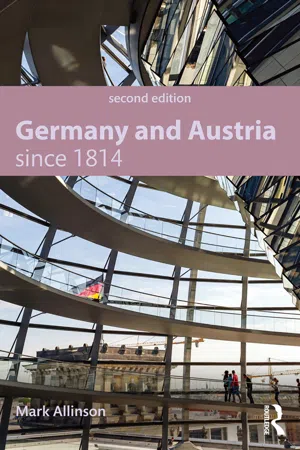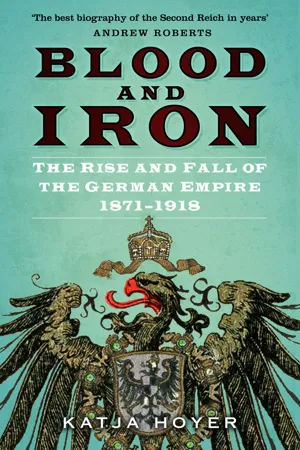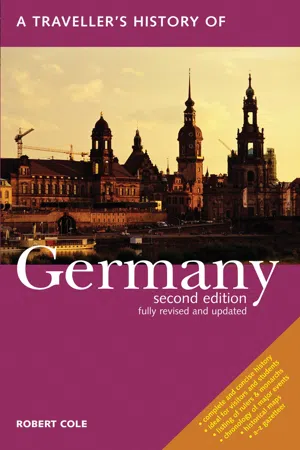History
Abdication of the Kaiser
The abdication of the Kaiser refers to the voluntary relinquishment of the German Emperor, Kaiser Wilhelm II, from the throne in 1918 at the end of World War I. This event marked the end of the German monarchy and the beginning of the Weimar Republic. The abdication was a significant moment in German history, symbolizing the collapse of the imperial regime and the transition to a new political era.
Written by Perlego with AI-assistance
Related key terms
1 of 5
3 Key excerpts on "Abdication of the Kaiser"
- eBook - ePub
- Mark Allinson(Author)
- 2014(Publication Date)
- Routledge(Publisher)
Kaiser did not abdicate.Wilhelm characteristically vacillated, hoping to save at least his Prussian crown even if the imperial dignity were lost. Ultimately, the Kaiser was pushed before he had quite resolved to jump. Prince Max announced Wilhelm’s abdication on 9 November and on his own authority transferred power to the SPD leader Friedrich Ebert. Before the day was out, rather to Ebert’s annoyance, a republic had been declared.The Wilhelmine era and the Kaiserreich itself were swept away on a swell of political, military and economic bankruptcy in November 1918. The conservatives’ grandiose schemes for expansion had collapsed, yet the conservatives themselves survived to fight another day, and the national ambitions they had encouraged in millions of ordinary Germans remained, albeit temporarily dormant. Meanwhile, the Reich, now Kaiser-less, was left to face the burdens it had itself planned to inflict on other nations.Österreich-Ungarn, 1867–1918
The Habsburg monarchy was severely weakened by its defeat at German hands in 1866 and its exclusion from German affairs. Though Bismarck persuaded Wilhelm I to preserve the Habsburg Empire, recognising that Germany would need a strong ally in the future, the rising tide of nationalism within the multinational empire began to unpick the bonds which united the Habsburg lands. The determination of the Hungarian aristocracy in the eastern half of Franz Josef’s empire to assert their traditional independence and freedoms, and the Kaiser’s recognition that his empire could not recover its strength while internal Hungarian opposition persisted, forced the empire’s division into two halves in the Ausgleich (Compromise) of 1867. The Hungarians recognised Franz Josef as their king (König), while he retained the title Kaiser in his ‘Austrian’ provinces. The two halves of the empire, now restyled Österreich-Ungarn, were linked by loyalty to the crown but were governed separately, from Vienna and Budapest respectively. The new dual monarchy had only a few institutions common to both halves, notably the army and the navy, to which were appended the abbreviation k. und k. (kaiserlich und königlich) - No longer available |Learn more
Blood and Iron
The Rise and Fall of the German Empire 1871–1918
- Katja Hoyer(Author)
- 2021(Publication Date)
- The History Press(Publisher)
* was indeed a two-year period without too much outward upheaval, but it was also one of a frustrating stand-off in the Reichstag. The latter certainly made an impression on contemporaries, who perceived the time from 1912–14 as a time of crisis. When the First World War eventually broke out in the summer of 1914 it was not in small part accompanied by hopes that once again political acrimony could be overcome through pan-German unity. Perhaps the deep fissures in the German political soul could once again be moulded together in the fires of war? Bismarck’s famous words rang true once more in many German ears: ‘Not through speeches and majority decisions will the great questions of the day be decided [...] but by iron and blood.’A Scandalous Kaiser
To contemporaries and later observers alike, Wilhelm has been an outrageous and fascinating man. Described as a ‘fabulous monster’* by a British biographer even during his lifetime, the Kaiser was seen as a tragic figure by sympathisers, as a prisoner of his times who was misunderstood and manipulated by those around him. Less sympathetic commentators have seen in him a megalomaniac, from the historian Ludwig Quidde’s infamous and thinly veiled depiction of Wilhelm as a modern Caligula† in 1894 to the civil servant Hermann Lutz’s assessment of the Kaiser’s ‘periodical insanity’.‡ Whatever people’s feelings towards the monarch, it was hard to be indifferent. Where his father and grandfather had both been agreeable orators but had largely reserved their public appearances to selected, formalised occasions with pre-written speeches, Kaiser Wilhelm II became a media monarch, courting the press in an almost modern sense. Restlessly, he travelled from town to town, showing himself to as many people as possible. Between 1897 and 1902 alone, he made 233 visits to 123 different towns§ - eBook - ePub
- Robert Cole(Author)
- 2014(Publication Date)
- Interlink Books(Publisher)
Prince Max did not act upon the demand. Then on 8 November, Kurt Eisner led an uprising of workers, soldiers and peasants in Bavaria that deposed the Wittels-bachs and proclaimed a Bavarian Democratic and Socialist Republic separate from Germany. A disgruntled Bavarian populace acquiesced. It was now clear to Prince Max and Reichswehr leaders in Berlin how large the crisis was. The next day, demonstrating factory workers filled the streets of Berlin, Spartacist leaders urged a Communist revolution, and a deputation of Majority Socialists led by Ebert and Scheidemann called upon Prince Max to demand the abdication of Wilhelm. Field Marshal Ludendorff and General Wilhelm Groener (1867—1939) understood that the ‘imperial jig was up’ and urged the Prince to give in. He did, declared the emperor and the crown prince abdicated, and handed over his office to Ebert. It was Prince Max’s hope that Ebert would represent a peaceful government transition that would avoid revolution, which, indeed, was Ebert’s intention. For the moment, he signed himself ‘Imperial Chancellor’ as a symbol of continuity. Meanwhile, Wilhelm did not want to abdicate, and demanded that he at least be left with the title King of Prussia. That too was denied (General Groener at one point suggested that the emperor might go to the front, place himselfat the head of a counterattack, be killed, and go out like a hero), and the now ex-emperor packed his bags and left for exile in Holland, never again to set foot in Germany. The Age of Wilhelm II was over. Friedrich Ebert, Reichspräsident until his death in 1925 What happened next was typical of the era. The German Republic was born on 9 November — by accident. At 2 p.m., 100,000 demonstrators filled the square in front of the Reichstag building. Philipp Scheidemann addressed them from a balcony, concluding his harangue by saying: ‘Workers, Soldiers, the German people has triumphed all along the line. A large part of the garrison has joined us
Index pages curate the most relevant extracts from our library of academic textbooks. They’ve been created using an in-house natural language model (NLM), each adding context and meaning to key research topics.


